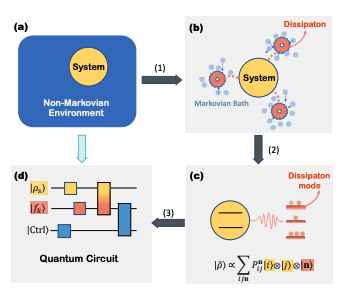Researchers from the Hefei National Research Center for Interdisciplinary Sciences, the University of Science and Technology of China, and Fudan University have developed a theory for simulating non-Markovian open quantum dynamics. Open Quantum Systems (OQS) are complex due to their interactions with their environment, often exhibiting non-Markovian features where past states influence the current state. The team’s theory, the dissipation-embedded quantum master equation in second quantization (DQMESQ), decomposes the non-Markovian environment into a set of independent generalized Brownian quasiparticles, or dissipation, providing a foundation for the accurate simulation of complex OQS.
Quantum Simulation of Non-Markovian Open Quantum Dynamics: A Universal and Compact Theory
A team of researchers from the Hefei National Research Center for Interdisciplinary Sciences at the Microscale, University of Science and Technology of China, and the Department of Chemistry, Fudan University, have developed a universal and compact theory for simulating non-Markovian open quantum dynamics. The team includes Xiang Li, SuXiang Lyu, Yao Wang, RuiXue Xu, Xiao Zheng, and YiJing Yan.
The Challenge of Non-Markovian Open Quantum Systems
Open Quantum Systems (OQS) have attracted significant attention due to their complex dynamical behavior resulting from interactions with their surrounding environment. These systems often exhibit non-Markovian features, characterized by memory effects where past states influence the current state. Understanding and characterizing these non-Markovian effects are crucial for physical processes such as quantum transport, quantum dephasing, coherent energy transfer, and precise measurement and control of quantum states. However, characterizing the non-Markovian effect in OQS has remained a longstanding challenge.
The Hierarchical Equations of Motion Method
Among the numerous attempts to address this challenge, the hierarchical equations of motion (HEOM) method has gained significant attention. The HEOM method characterizes non-Markovianity through a two-time correlation function in the form of a memory kernel, which is decomposed and reorganized within a hierarchy to account for all the possible dissipation modes. However, the exponential growth of dynamical variables presents serious challenges in computational time and data storage, making it difficult to apply HEOM and other non-Markovian quantum dissipation methods to complex OQS within existing classical computational frameworks.
The Promise of Quantum Computation
The rapid progress in quantum technologies has launched a new era of computational capabilities, enabling exploration of previously inaccessible realms of modern science. Quantum computation holds promise for efficiently simulating OQS. Several quantum computing algorithms have been developed for simulating quantum dynamics, including full quantum algorithms and quantum-classical hybrid algorithms based on the variational principle. However, simulating non-Markovian OQS in quantum circuits remains a challenging task.
The Dissipaton-Embedded Quantum Master Equation in Second Quantization (DQMESQ) Theory
The researchers aim to establish a universal and compact theory, the dissipaton-embedded quantum master equation in second quantization (DQMESQ), which enables the quantum simulation of non-Markovian open quantum dynamics. The DQMESQ theory effectively decomposes the non-Markovian environment into a set of statistically independent generalized Brownian quasiparticles referred to as dissipatons. The dynamics of the extended system consisting of the system and dissipatons is governed by the DQME, which is a time-local Fokker-Planck-like equation.
The Construction of DQMESQ Theory
The construction of DQMESQ theory starts with the dissipaton decomposition (DD), which should preserve the correlation function Ct. The DD maps the environment hybridization operator onto the coordinate operators of dissipatons. For individual dissipaton, the non-Markovian memory is fully recovered through the statistics of dissipatons. The DQMESQ formalism enables the quantum simulation of non-Markovian open quantum dynamics, providing a solid foundation for the accurate and efficient simulation of complex open quantum systems.
In the article “Towards Quantum Simulation of Non-Markovian Open Quantum Dynamics: A Universal and Compact Theory,” authors Xiang Li, SuPing Lyu, Yao Wang, Rui-Xue Xu, Xiao Zheng, and YiJing Yan present a new theory in the field of quantum simulation. The paper was published on January 30, 2024, and is available on the arXiv platform hosted by Cornell University. The full article can be accessed through its DOI: 10.48550/arxiv.2401.17255.

